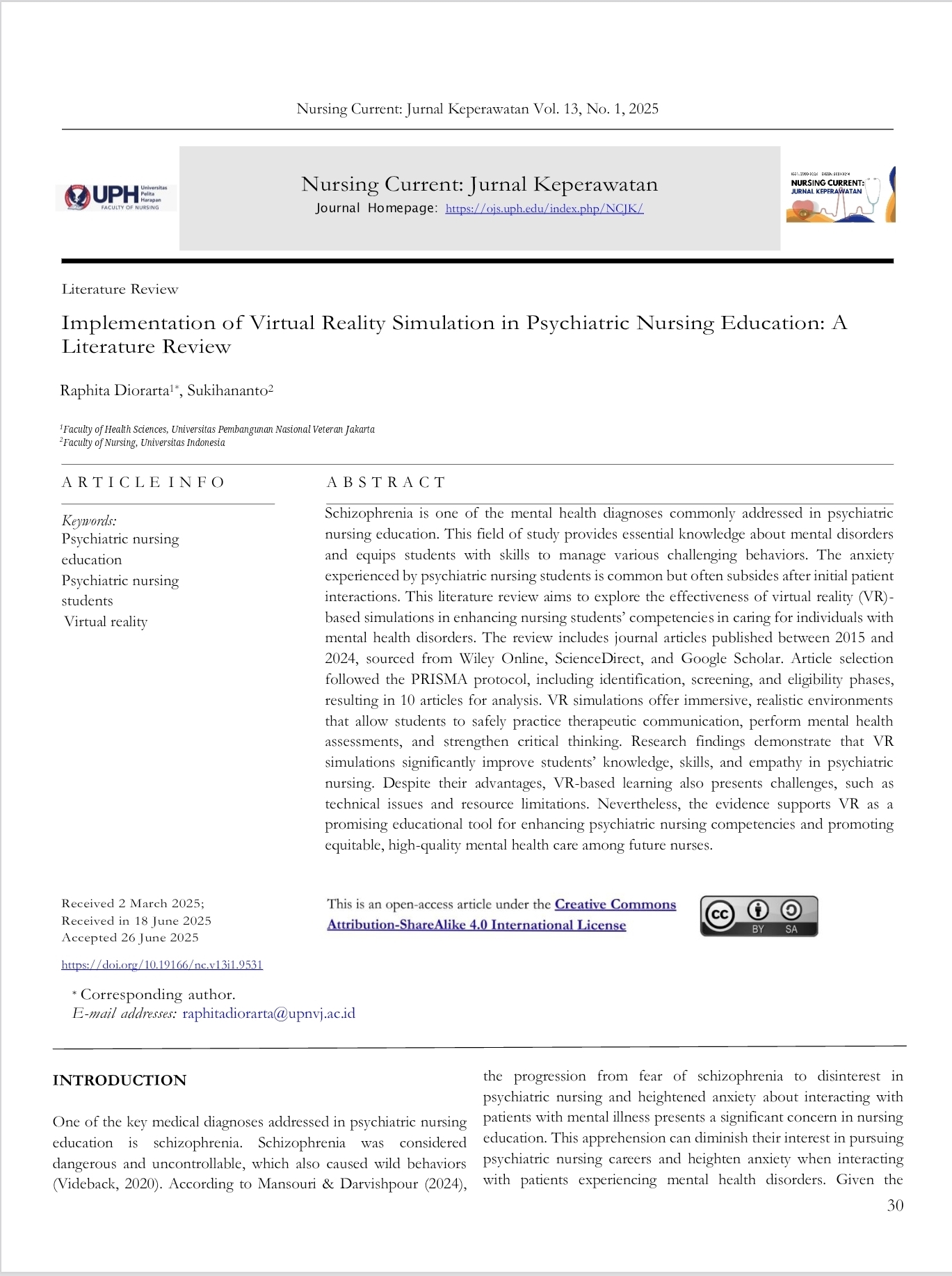Implementation of Virtual Reality Simulation in Psychiatric Nursing Education: A Literature Review
DOI:
https://doi.org/10.19166/nc.v13i1.9531Keywords:
Virtual Reality, Psychiatric Nursing Students, Psychiatric Nursing EducationAbstract
One of the medical diagnoses of mental disorders that is part of education in psychiatric nursing is schizophrenia. Part of the education of psychiatric nursing provides important information about mental disorders and learns new skills to deal with various challenging behaviors. The anxiety felt by psychiatric nursing students are normal and usually do not continue after students have initial contact with patients. Aim on this study is to explore the effectiveness of VR-based simulations in enhancing the skills of nursing students in caring for patients with mental health disorders. This study method uses literature review. The literature used in this study consists of journals sourced from Wiley Online, ScienceDirect, and Google Scholar between 2015 and 2024. Article selection used the protocol guidelines (PRISMA) of identification, screening, eligibility and resulted in 10 articles being analyzed. VR simulations provide immersive and realistic environments where students can safely practice therapeutic communication, conduct mental health assessments, and develop critical thinking skills. Research indicates that VR simulations significantly enhance students' skills, knowledge, and empathy in psychiatric nursing. Despite their advantages, VR technologies face limitations, such as VR technology presents challenges such as technical difficulties. However, evidence suggests that VR-based training is a promising tool for advancing psychiatric nursing education by fostering essential skills and promoting behavioral health equity among future nurses.
References
Brown, A. M. (2015). Simulation in Undergraduate Mental Health Nursing Education: A Literature Review. Clinical Simulation in Nursing, 11(10), 445–449. https://doi.org/10.1016/j.ecns.2015.08.003
Formosa, N. J., Morrison, B. W., Hill, G., & Stone, D. (2018). Testing the efficacy of a virtual reality-based simulation in enhancing users’ knowledge, attitudes, and empathy relating to psychosis. Australian Journal of Psychology, 70(1), 57–65. https://doi.org/10.1111/ajpy.12167
Hardy, S., Mushore, M., & Goddard, L. (2016). Supporting student mental health nurses in clinical placement through virtual in-practice support (VIPS): Innovation uptake and the ‘VIPS’ project. Nurse Education Today, 46, 133–138. https://doi.org/10.1016/j.nedt.2016.08.033
Jensen, L., & Konradsen, F. (2018). A review of the use of virtual reality head-mounted displays in education and training. Education and Information Technologies, 23(4), 1515–1529. https://doi.org/10.1007/s10639-017-9676-0
Kiegaldie, D., & Shaw, L. (2023). Virtual reality simulation for nursing education: effectiveness and feasibility. BMC Nursing, 22(1), 1–13. https://doi.org/10.1186/s12912-023-01639-5
Kim, G. M., Lim, J. Y., & Kim, J. (2023). Assessing the Effectiveness of a Virtual Reality-Based Simulation Program for Mental Health Nursing Practicum. 1–18. https://doi.org/10.21203/rs.3.rs-3756375/v1
Kyaw, B. M., Saxena, N., Posadzki, P., Vseteckova, J., Nikolaou, C. K., George, P. P., Divakar, U., Masiello, I., Kononowicz, A. A., Zary, N., & Car, L. T. (2019). Virtual reality for health professions education: Systematic review and meta-analysis by the digital health education collaboration. Journal of Medical Internet Research, 21(1). https://doi.org/10.2196/12959
Lee, M., Kim, S.-K., Go, Y., Jeong, H., & Lee, Y. (2024). Positioning virtual reality as means of clinical experience in mental health nursing education: A quasi-experimental study. Applied Nursing Research, 77, 151800. https://doi.org/https://doi.org/10.1016/j.apnr.2024.151800
Lee, Y., Kim, S. K., & Eom, M. R. (2020). Usability of mental illness simulation involving scenarios with patients with schizophrenia via immersive virtual reality: A mixed methods study. PLoS ONE, 15(9 September), 1–13. https://doi.org/10.1371/journal.pone.0238437
Liu, W. (2021). The Effects of Virtual Simulation on Undergraduate Nursing Students’ Beliefs about Prognosis and Outcomes for People with Mental Disorders. Clinical Simulation in Nursing, 50, 1–9. https://doi.org/https://doi.org/10.1016/j.ecns.2020.09.007
Mansouri, F., & Darvishpour, A. (2024). Nursing students’ metaphors of first clinical experiences of encountering patients with mental disorders. BMC Nursing, 23(1), 1–12. https://doi.org/10.1186/s12912-024-01780-9
Ose, S. O., Færevik, H., Kaasbøll, J., Lindgren, M., Thaulow, K., Antonsen, S., & Burkeland, O. (2019). Exploring the potential for use of virtual reality technology in the treatment of severe mental illness among adults in mid-Norway: Collaborative research between clinicians and researchers. Journal of Medical Internet Research, 21(6), 1–8. https://doi.org/10.2196/13633
Park, K. M., Ku, J., Choi, S. H., Jang, H. J., Park, J. Y., Kim, S. I., & Kim, J. J. (2011). A virtual reality application in role-plays of social skills training for schizophrenia: A randomized, controlled trial. Psychiatry Research, 189(2), 166–172. https://doi.org/10.1016/j.psychres.2011.04.003
Piispanen, N., Haavisto, E., Hublin, L., Ikonen, R., & Koivisto, J. M. (2024). Nursing students’ perceptions of interaction in a multiplayer virtual reality simulation: A qualitative descriptive study. Nursing Open, 11(8), 1–9. https://doi.org/10.1002/nop2.2245
Saab, M. M., Landers, M., Murphy, D., O’Mahony, B., Cooke, E., O’Driscoll, M., & Hegarty, J. (2022). Nursing students’ views of using virtual reality in healthcare: A qualitative study. Journal of Clinical Nursing, 31(9–10), 1228–1242. https://doi.org/10.1111/jocn.15978
Sunnqvist, C., Karlsson, K., Lindell, L., & Fors, U. (2016). Virtual patient simulation in psychiatric care - A pilot study of digital support for collaborate learning. Nurse Education in Practice, 17, 30–35. https://doi.org/10.1016/j.nepr.2016.02.004
Videback, S. L. (2020). Psychiatric/mental health nursing. In Psychiatric-Mental Health Nursing Eight Edition (Vol. 21, Issue 3).

Downloads
Published
How to Cite
Issue
Section
License
Copyright (c) 2025 Raphita Diorarta, Sukihananto Sukihananto

This work is licensed under a Creative Commons Attribution-ShareAlike 4.0 International License.
Authors who publish with this journal agree to the following terms:
1) Authors retain copyright and grant the journal right of first publication with the work simultaneously licensed under a Creative Commons Attribution License (CC-BY-SA 4.0) that allows others to share the work with an acknowledgement of the work's authorship and initial publication in this journal.
2) Authors are able to enter into separate, additional contractual arrangements for the non-exclusive distribution of the journal's published version of the work (e.g., post it to an institutional repository or publish it in a book), with an acknowledgement of its initial publication in this journal.
3) Authors are permitted and encouraged to post their work online (e.g., in institutional repositories or on their website). The final published PDF should be used and bibliographic details that credit the publication in this journal should be included.

This work is licensed under a Creative Commons Attribution-ShareAlike 4.0 International License.

